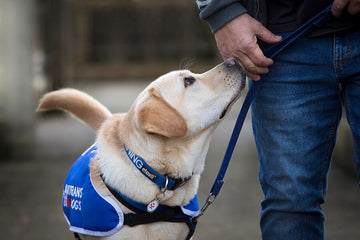Service dogs play a crucial role in supporting individuals with various disabilities, both visible and invisible, in the UK. These specially trained animals assist their handlers in navigating daily life, enhancing independence and quality of life.
Understanding Service Dogs
An assistance dog, also referred to as a service dog, is specially trained to perform tasks that mitigate the effects of a person's disability. Unlike emotional support animals or therapy dogs, service animals are protected by law and have legal rights to accompany their owners in public places such as shops, restaurants, and public transport.
Legal Framework
In the UK, the rights of individuals with assistance dogs are protected under:
-
Equality Act 2010 (England, Scotland, and Wales)
-
Disability Discrimination Act 1995 (Northern Ireland)
These laws require service providers to make reasonable adjustments to accommodate assistance dog users, ensuring they are not discriminated against due to their disability.

Disabilities Commonly Supported by Assistance Dogs
Assistance dogs can be trained to support a variety of disabling conditions, including:
1. Visual Impairment
Guide dogs assist individuals who are blind or partially sighted in navigating their environment safely.
2. Hearing Impairment
Hearing dogs alert their handlers to important sounds like doorbells, alarms, or approaching vehicles.
3. Physical Disabilities
Mobility assistance dogs help with tasks such as opening doors, retrieving items, and providing balance support.
4. Medical Conditions
-
Seizure Alert Dogs can detect the onset of seizures and provide assistance during and after episodes.
-
Diabetic Alert Dogs monitor blood sugar levels and alert their handlers to dangerous highs or lows.
-
Cardiac Alert Dogs notify handlers of impending heart-related issues.
5. Autism Spectrum Disorders
Autism assistance dogs support individuals, especially children, by improving safety, reducing anxiety, and aiding in social interactions.
6. Mental Health Conditions
Psychiatric assistance dogs assist individuals with conditions like PTSD, anxiety, or depression by performing tasks such as interrupting harmful behaviors or providing deep pressure therapy.
7. Developmental and Neurological Disorders
Individuals with conditions like ADHD or cerebral palsy may benefit from assistance dogs trained to meet their specific needs.

Training and Certification
Assistance dogs can be:
-
Trained by Accredited Organizations: Groups like Assistance Dogs UK (ADUK) oversee charities that adhere to high training standards.
-
Owner-Trained: Handlers can train their own dogs, provided the dog meets the required behavior and task-specific criteria.
It's important to note that while identification badges or vests can be helpful, they are not legally required. Service providers should not demand proof of certification or identification for an assistance dog.
Public Access Rights
Assistance dog handlers have the right to access:
-
Public transportation
-
Restaurants and shops
-
Workplaces
-
Educational institutions
-
Housing (including rental properties)
Service providers must make reasonable accommodations and cannot charge extra fees or deny entry based on the presence of an assistance dog.
Conclusion
Assistance dogs are invaluable companions for individuals with various disabilities, offering support that enhances independence and well-being. If you or someone you know could benefit from an assistance dog, consider reaching out to accredited organizations or consulting with healthcare professionals to explore the options available.




